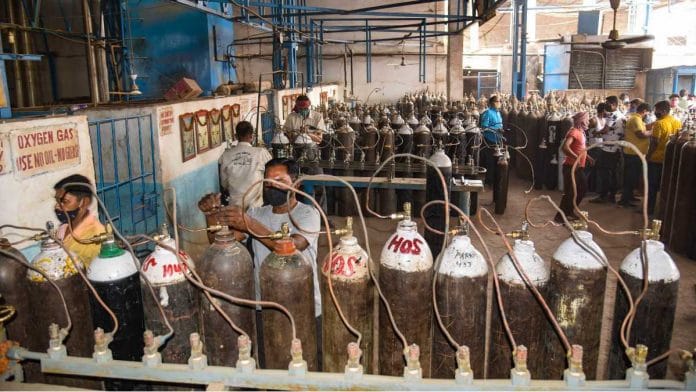New Delhi: A court-appointed expert group is now in the process of assessing the correct oxygen demand in Covid-19 patients, but there is a large patient group that will put additional pressure on the already stretched oxygen resources in the country.
Lung fibrosis is one of the most common problems in patients who have recovered from an infection of the SARS-CoV2 virus and many of these patients continue to require oxygen long after they are pronounced Covid-free.
“As we know from our own everyday experience, scar tissue is different from normal tissue. It is known that Covid can cause lung injury. As the lung heals, some part of it becomes fibrosed — scar tissue is fibrous in nature. This is called lung fibrosis and the fibrosed parts of the lungs become largely non-functional,” said Dr V.K. Paul, Member (Health) NITI Aayog.
“Fibrosis of the lungs either takes a very long time to heal or does not heal at all. Depending on the severity of the fibrosis, some people may require oxygen. Fibrosis usually starts setting in on the second or third week after infection is over,” Paul told ThePrint.
The fact that Covid can cause severe injuries to the lungs is now well known and is the reason why CT scans have now started being used widely as a diagnostic tool.
Doctors say that in many patients where the RT-PCR tests are negative, these scans often show Covid-related damage. Fibrosis occurs as a part of the recovery process of the lungs. Doctors say patients could require oxygen for two-three weeks but it could extend even up to three months.
Lung fibrosis as a post-Covid complication is well-documented in medical literature.
“Progressive fibrotic lung disease is one of the possible consequences of COVID-19 pulmonary pneumonia, and it is one of the most worrying long-term complications. Pulmonary fibrosis is associated with non-reversible lung dysfunction,” Egyptian researchers wrote in an article in the Egyptian Journal of Radiology and Nuclear Medicine last month.
Also read: Growing plasma, remdesivir use will help Covid virus mutate, become stronger: Ex-ICMR scientist
Oxygen dependence in post-Covid patients is known
In a review published in Lung India after the first wave peak, Dr Zarir Udwadia, pulmonary medicine specialist from Mumbai’s Hinduja Hospital wrote: “In the space of 7 short months, the SARS-COV-2 virus has acutely infected more than 50 million people and killed over 1.2 million. It has left in its wake, in severely affected survivors, a trail of devastating pulmonary fibrosis which physicians will need to urgently address and manage.”
He added, “While fibrosis is a physiologic response to any pulmonary infection, chest physicians across the globe are encountering vast number of patients who have recovered from their acute COVID-19 pneumonia only to be left with severe residual lung fibrosis and oxygen dependence.”
The numbers have since risen manifold and many of these patients have now been forced either to keep an oxygen arrangement at home or make intermittent visits to the hospital principally for oxygen.
Dr S. Chatterjee, consultant medicine, Indraprastha Apollo Hospital said, “We saw a lot of post-Covid lung fibrosis in the first wave. This wave is still new and the next few weeks will tell us how badly lungs are being affected. In the last wave we saw a lot of patients who had to be put on oxygen, some even tried lung transplant.”
She added, “This time the number of patients infected is huge and the proportion of patients requiring oxygen is also a lot more than last time. Usually about 15 per cent patients require oxygen after recovery but we still need to see what those numbers are this time.”
(Edited by Amit Upadhyaya)
Also read: Modi govt expects second Covid wave surge to come down ‘sharply’ by July






